Why you can trust Tom's Hardware
Given the recent string of events that have found AMD catching Intel off guard with every new release, it is surprising to see Team Red so unprepared in the face of Intel's lower-priced chips.
AMD's Zen 3-powered Ryzen 5000 family took the lead from Intel's Comet Lake in every performance metric that matters, and the chips have even proven to be powerful enough to keep the edge over the higher-end Rocket Lake processors. However, AMD's premium pricing has nullified Zen 3's impact on the entry-level gaming market, leaving Intel an opening that it is all too happy to exploit.
As you can see in our geometric mean of gaming performance below, the Ryzen 5 3600 isn't competitive from either a pricing or performance standpoint with the Core i5-11400 (or Core i5-11400F). Just bear in mind that we conducted these tests with an RTX 3090, so performance deltas will shrink with lesser cards and higher resolution and fidelity settings.
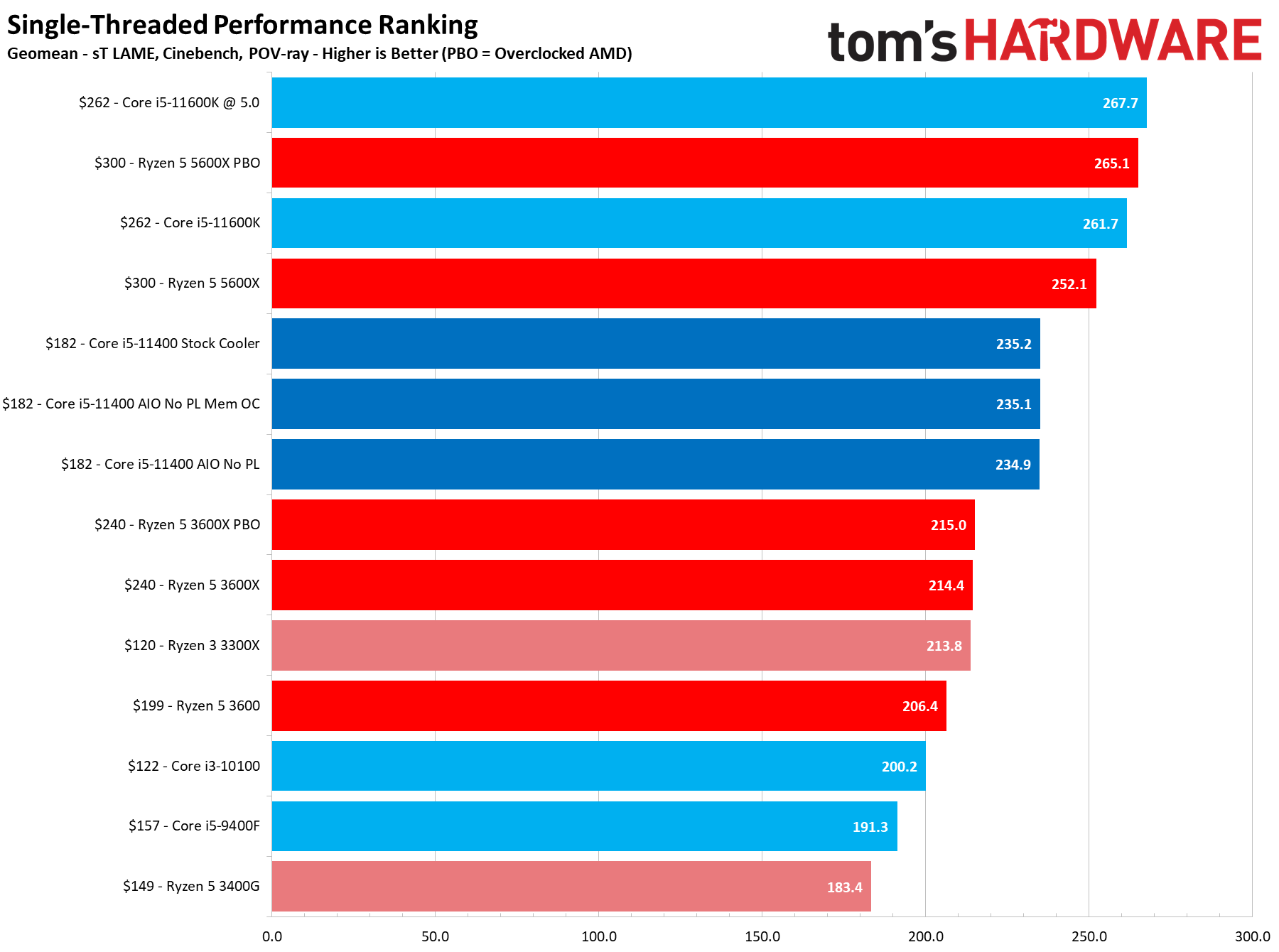
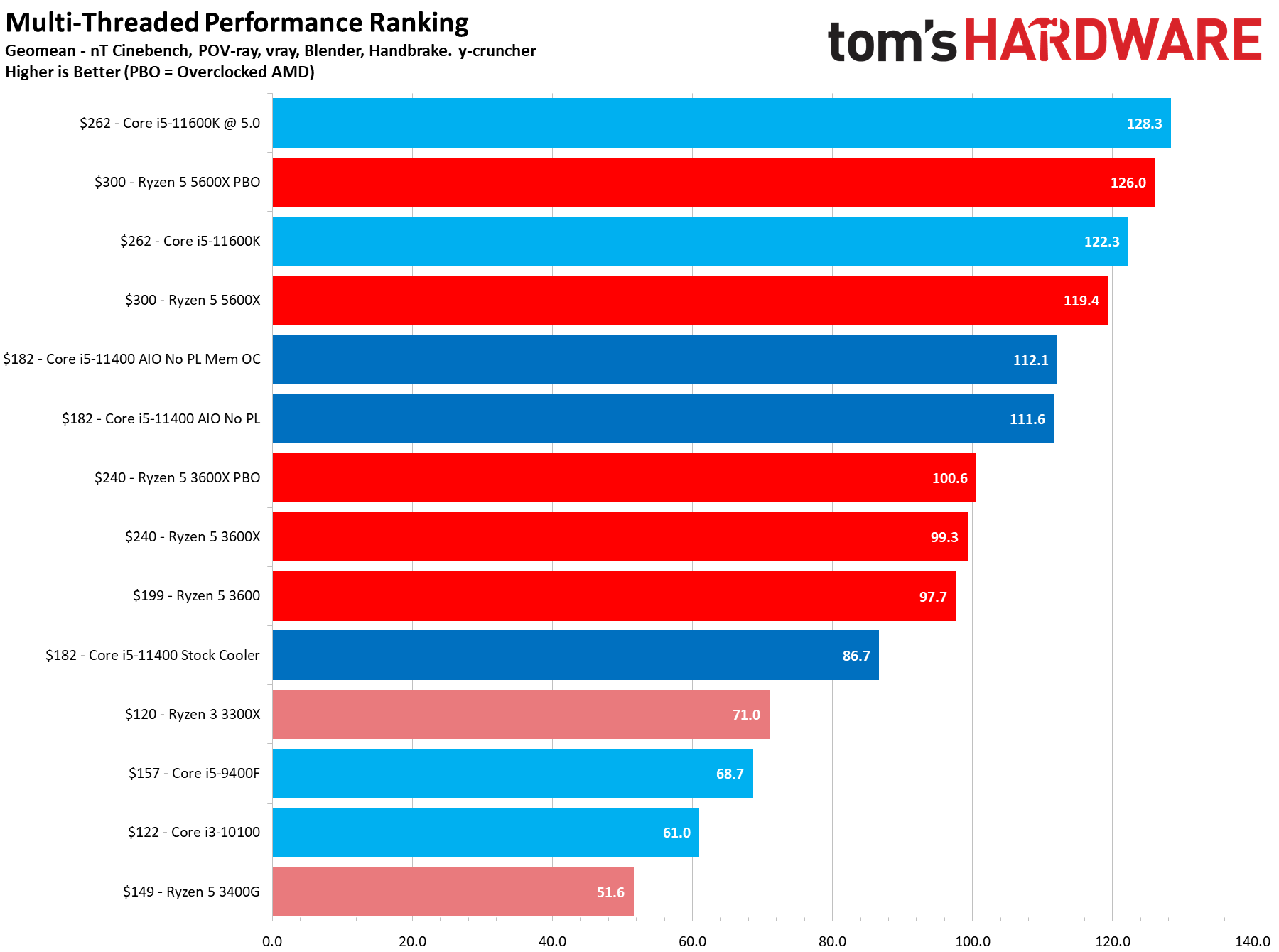
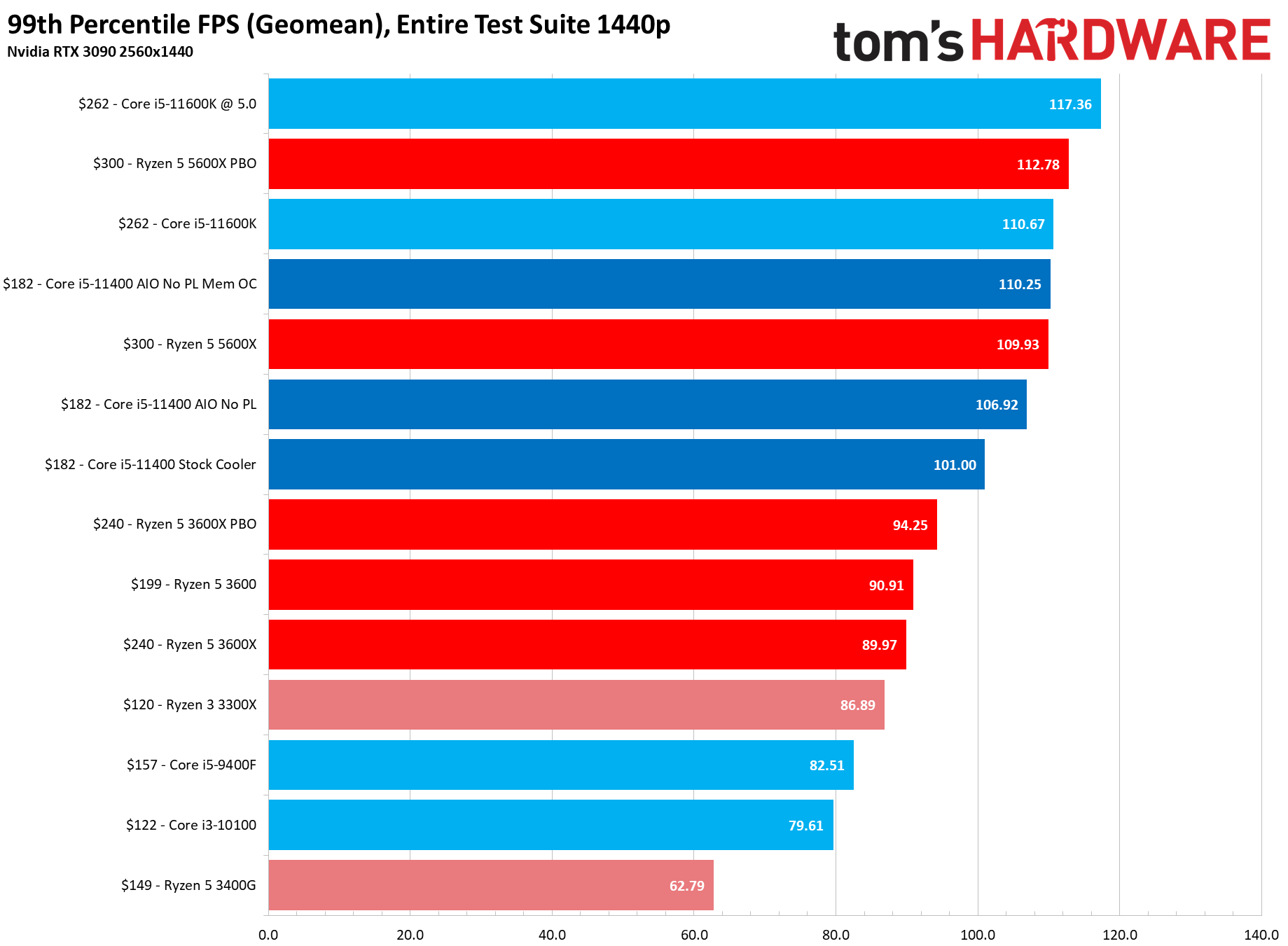
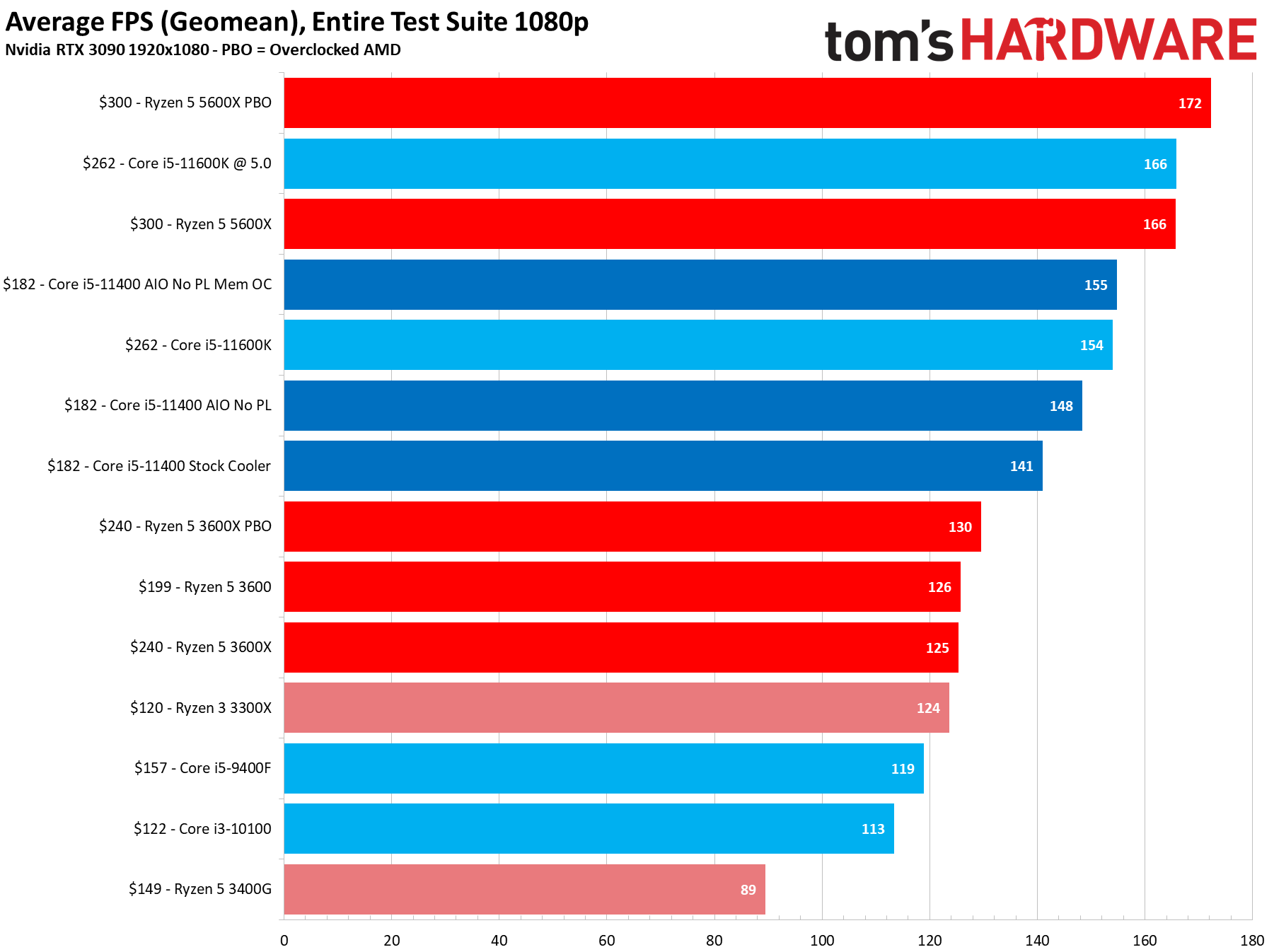
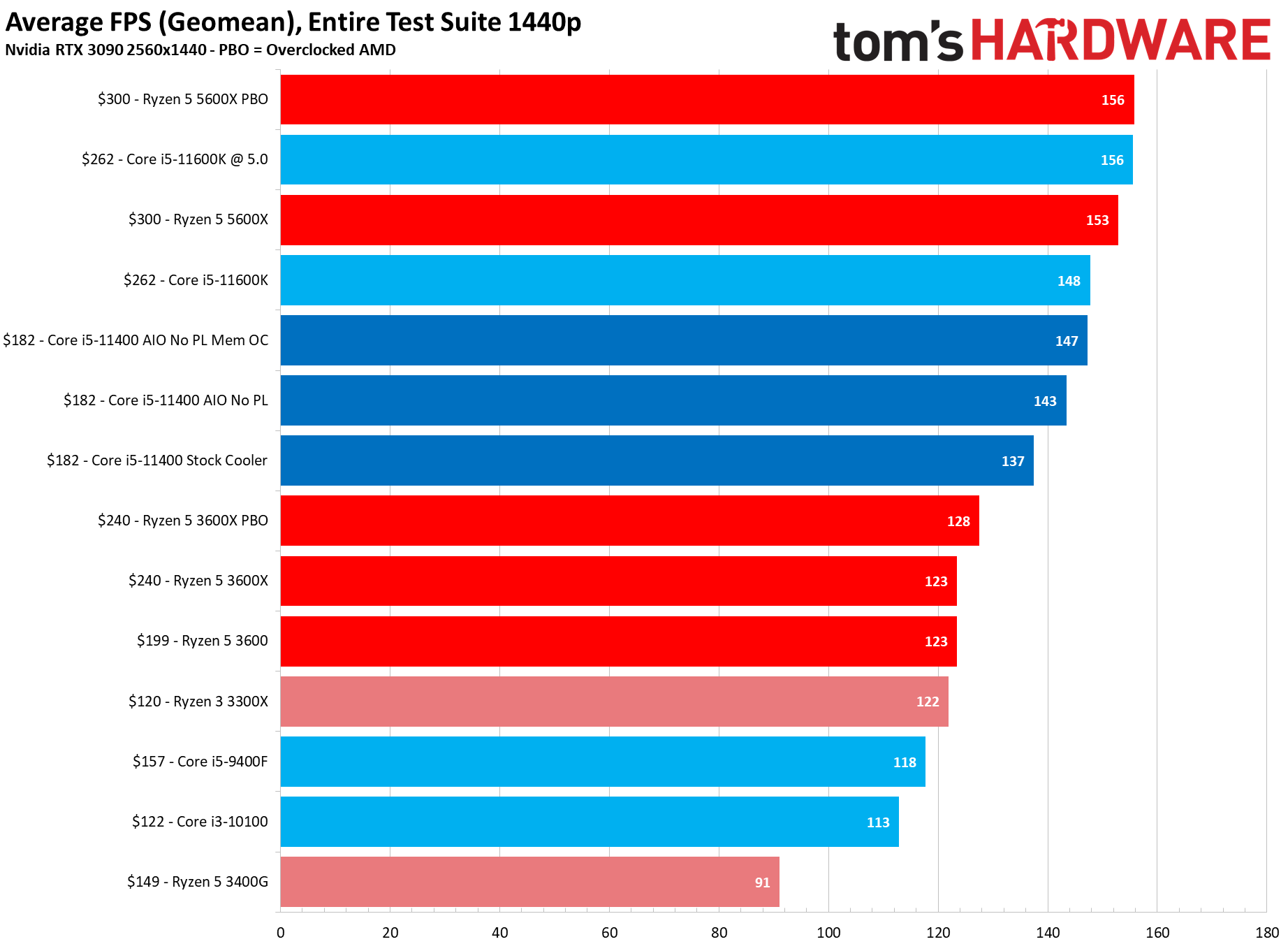
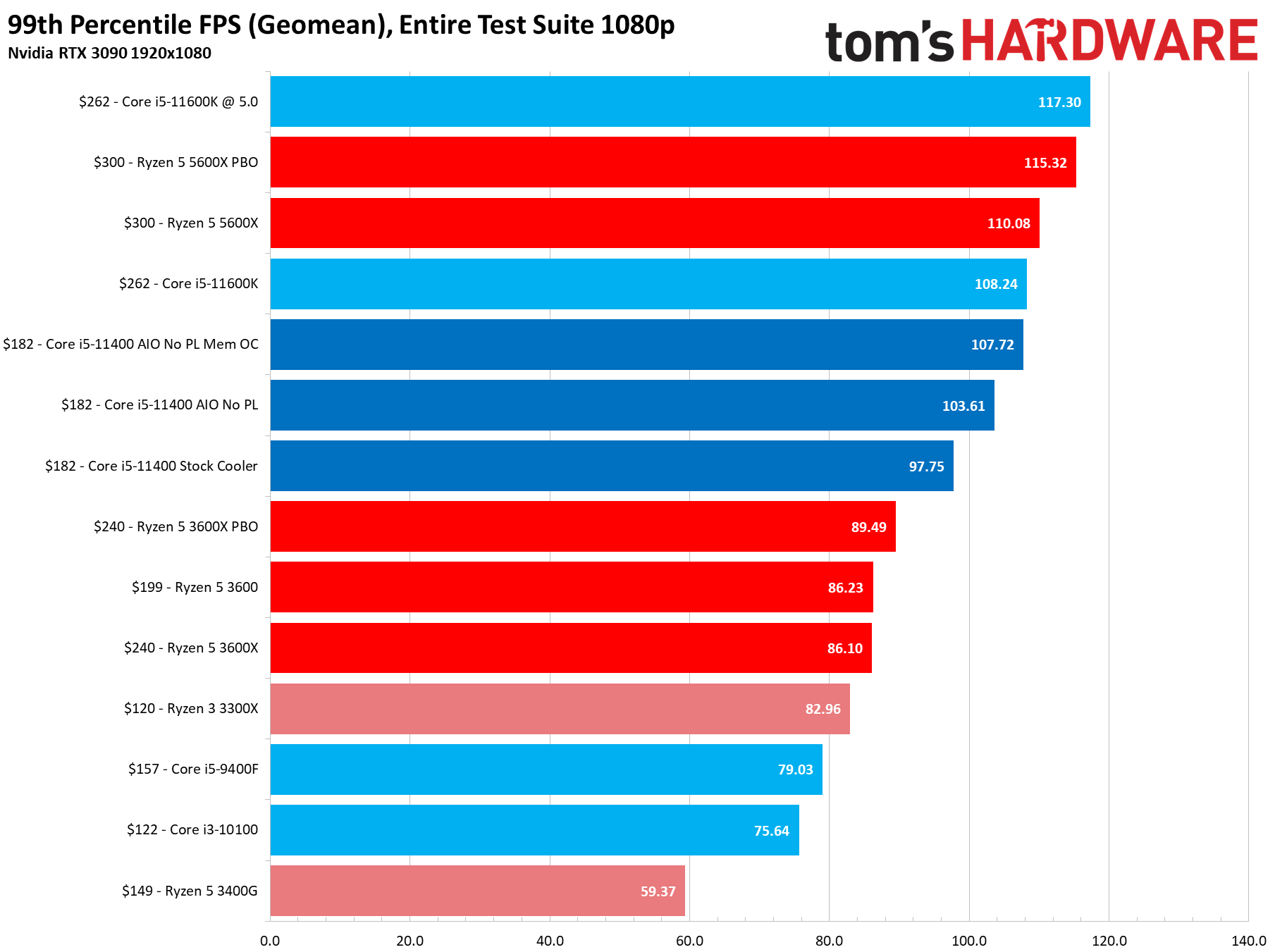
In gaming, the $182 Core i5-11400 delivers a blowout victory over the Ryzen 5 3600 that often retails for $200 or more. In fact, you can pick up the graphics-less Core i5-11400F for $157, which is a steal given this level of gaming performance. (Remember, the 11400F will perform the same as the non-F model, but you lose QuickSync.)
Taken as a whole, the Core i5-11400 has a better blend of performance throughout our full suite of application tests, too. The 11400's large lead in single-threaded work is impressive, and its only deficiencies in threaded work come when it is topped with its stock cooler. With a better cooler, the 11400 roughly matches the 3600 in threaded work even with the power limits strictly enforced, while removing those limits gives the 11400 uncontested lead.
You still can't overclock the core frequency on non-K chips, but B-series motherboards allow you to lift the power limits, thus unlocking much more performance in threaded workloads. You'll just have to be prepared to pay the price in both power and heat generation. Intel has now enabled memory overclocking on its B560 and H570 chipsets, and it works with any chip that is compatible with the platform. The 11400 profits greatly from memory overclocking, particularly in gaming. Just remember that the effective range of the Gear 1 mode only stretches to ~DDR4-3800, so don't waste cash on a super-expensive kit.
The Core i5-11400 does consume more power than AMD's competing chips, but its TDP envelope is much lower than the higher-end Rocket chips, taking away some of the sting. That said, you'll have to overlook the higher power consumption if you go with the Core i5-11400, especially if you remove the power limits. Intel's stock cooler is also largely worthless for enthusiasts, so you should budget for a better cooler. AMD's Ryzen 5 3600 does come with a bundled cooler, but given the current market conditions, the 3600 isn't really a viable option due to vastly inflated pricing.
If you're only interested in gaming and don't plan to overclock, the Core i5-11400 is a much better value than the Core i5-11600K and leaves some extra room in the budget for a GPU. Some might recommend going with a 10th-gen Core i5-10400 as an alternative to the 11400, but we think you'll benefit more from having the 20 lanes of PCIe 4.0 connectivity and much faster single-threaded performance.
AMD simply doesn't have a suitable chip in this price range to contend with the Core i5-11400. The Ryzen 5 3600 suffers from a severe shortage, and thus higher pricing, while the Core i5-11400 is widely available.
We expect that AMD will eventually refresh its Ryzen 3 series — hopefully with chips we can actually buy this time around instead of unicorn chips like the Ryzen 3 3300X — but the real answer here is a competitively priced non-X Ryzen 5 5600. Given that AMD is currently suffering from supply constraints and can sell every piece of silicon it can punch out at a premium, we're not convinced that will happen any time soon.
As a result of its solid performance and excellent pricing, the Core i5-11400 is the uncontested leader of the budget gaming PC market.
MORE: Best CPUs
Get Tom's Hardware's best news and in-depth reviews, straight to your inbox.
MORE: CPU Benchmarks and Hierarchy
MORE: All CPUs Content
Current page: Uncontested Pricing Meets Strong Gaming Performance
Prev Page Intel Core i5-11400 Application Benchmarks, The TLDR
Paul Alcorn is the Editor-in-Chief for Tom's Hardware US. He also writes news and reviews on CPUs, storage, and enterprise hardware.
-
caromero1965 Better to let Intel have lower margin sales and focus on servers and to some degree laptops. Follow the money.Reply -
sosofm Reply
I don't think that. The power consumption is double in comparison with 3600 and 5600x . More power consumption = more heat =better cooling = more money.Why_Me said:The Ryzen 3600 is dead man walking. -
punkncat Replysosofm said:I don't think that. The power consumption is double in comparison with 3600 and 5600x . More power consumption = more heat =better cooling = more money.
Under the most predominant use these will see a stock cooler should be (mostly) fine. A "gamer" would (probably not really be looking at) budget in a better cooling option anyway, IMO.
The energy cost difference is on the level of a candy bar and a soda level for the year. -
octavecode 2x Ryzen 3600 less power consumption than a single i5 11400, but intel gets the crown?Reply
No thanks... -
hotaru251 Reply
except AMD likely will release a lower tier cpu as it took a bit for that to happen even last gen. (and when your CPU are selling out basically immediately no need to release a cheaper one yet)punkncat said:This feels much like a replay of 2017, in reverse.... -
Why_Me Replysosofm said:I don't think that. The power consumption is double in comparison with 3600 and 5600x . More power consumption = more heat =better cooling = more money.
The 11400F w/stock cooler mops the floor with the 3600 . Add a $30 - $40 aftermarket cooler, remove the power limits in the bios and it gets even worse for the 3600. There's multiple reviews on the net to back that up.octavecode said:2x Ryzen 3600 less power consumption than a single i5 11400, but intel gets the crown?
No thanks...
https://overclock3d.net/reviews/cpu_mainboard/intel_core_i5_11400f_and_asus_b560_plus_prime_review/1Intel Core i5 11400F and ASUS B560 Plus Prime Review
https://www.tomshardware.com/news/intel-core-i5-11400-reviewIntel Core i5-11400 Review
https://www.guru3d.com/articles_pages/intel_core_i5_11400f_processor_review,1.htmlIntel Core i5-11400F Review
https://www.techspot.com/review/2232-intel-core-i5-11400f/Intel Core i5-11400F Review
https://www.profesionalreview.com/2021/04/26/intel-core-i5-11400f-review/Intel Core i5-11400F Review
pOpWJCWYa6k
crU9V1GNocI -
JediWombat Utter nonsense. Intel's brand new processor outperforms AMD's almost-two-year-old chip? So it should! It's two years newer!Reply
Tom's Hardware is so blatantly biased towards Intel these days, you should be embarrassed. -
helper800 Reply
If you see bias its because you are imagining things. Toms called it when AMD released the 3000 and 5000 series processors that they were better than intel's offerings at the time in their own respective ways. Though AMD costs more than this particular Intel processor, it took Intel breaking years of its own norms by adding so many features that AMD has had standard for over a decade that Intel effectively priced out its own top tier parts. It used to be that you had to pay the K tax to get overclocking on a 4 core 4-8 thread processor for almost 8 years. This is just one major norm intel had to break to remain relevant. Competition is good, and if AMD does not provide a compelling product at every price range Intel will come in with something good, and they did. Who cares about brand loyalty? We all win in these circumstances...JediWombat said:Tom's Hardware is so blatantly biased towards Intel these days, you should be embarrassed.